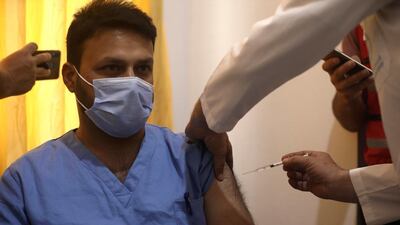Frontline medical workers in Syria's last rebel-held enclave are getting their first coronavirus vaccines, after a 21-day campaign began on Saturday.
Coronavirus cases have risen steadily in Idlib in recent weeks.
The number of infections in the region now stands at 21,000, according to data from the Covid-19 Surveillance Unit in north-west Syria.
"The aim is to administer the vaccines to all of the region's 28,000 medical and humanitarian workers," Dr Yassir Najib, who heads the Idlib governorate inoculation team's technical committee, told The National.
On Wednesday, 53,800 doses of the British AstraZeneca vaccine arrived in Idlib, under the UN-backed Covax scheme for equitable vaccine distribution.
"The amount is lower than we were promised. We expected to receive 124,000 in the first batch but we only got 53,800 doses," Dr Hossam Qara Mohammed, head of the coronavirus coronavirus infection control programme in Idlib's health authority, said.
More than 90 teams in the opposition-held north-western region will travel to medical facilities and other locations to inoculate healthcare and humanitarian workers.
"We have been preparing for this rollout for 10 days," Dr Rifaat Al Farhat, who heads the Idlib inoculation programme, told The National.
“We opened the doors of the first of Idlib’s 56 health centres on Saturday, where 22 out of the 30 intended individuals were inoculated. The remaining eight could not make it for work-related reasons.”
The rest of the centres would begin inoculations on Monday, Dr Al Farhat said.
Dr Najib said frontline workers account for 30 per cent of all reported Covid-19 infections but the actual figures are difficult to determine.
"Many people do not go for tests when they begin feeling symptoms of the virus," he said.
"So the real spread among the public is much greater than what has been recorded."
A second batch of 255,000 shots was scheduled for the third quarter of the year as agreed with the World Health Organisation, Dr Qara Mohammed said.
The vaccines are manufactured in India – a country now reeling from the second-highest number of infections in the world .
The Covid-19 crisis in India could lead to delays in the arrival of the vaccines in Syria, the official said. Logistical problems under a health sector that has broken down during the 10-year civil war are among the challenges Idlib’s team has to overcome .
Vaccine hesitancy, particularly among health workers and young people, compounds this issue, Ted Chaiban, the UN children’s fund regional director for the Middle East and North Africa, said last month .










